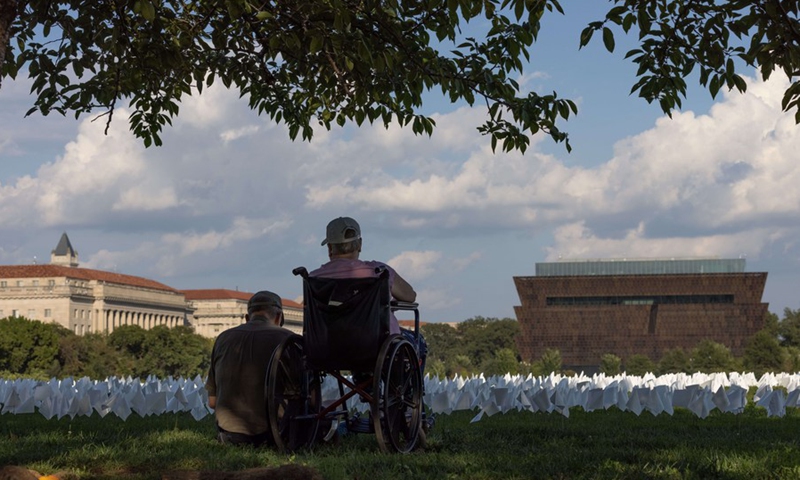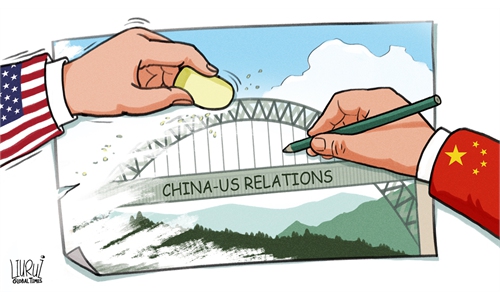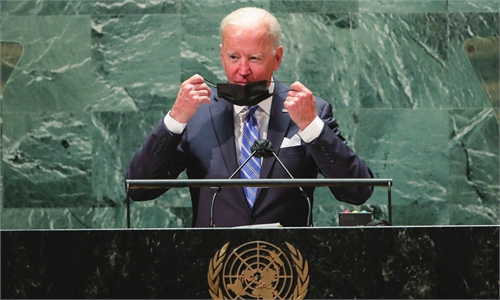Biden boasts COVID-19 pledge despite anti-virus blunders in US
Global vaccination rate schedule questioned as China, Russia absent: expert

Visitors sit beside white flags placed on the National Mall to honor the lives lost to COVID-19 in Washington, D.C., the United States, Sept. 18, 2021.(Photo: Xinhua)
The irony speaks for itself. The US, where the unabated COVID-19 pandemic has claimed more lives in the country than the 1918 flu pandemic, and being accused as the world's biggest hoarder of surplus COVID-19 vaccines, sought to set a course for global vaccine allocation on Wednesday.
Similar to the many other "global summits" US President Joe Biden has summoned after taking office, this one also serves Biden's goal of shoring up US leadership and a "face-saving" move as the many blunders the US made during its COVID-19 fight has shamed itself in front of the world, said Chinese observers.
They also predicted that given US' selfishness in hoarding and snatching COVID-19 vaccines, its bridge burning and backstabbing foreign diplomacy and its "either us or them" Cold War mentality, this COVID-19 summit will likely be a "one-man show" centered on hollow US promises.
The virtual summit would be convened by Biden on Wednesday on the margins of the UN General Assembly, the White House announced.
Jen Psaki, White House press secretary, said Biden would ask for a "higher level of ambition" in the following areas: vaccinating the world; making oxygen, therapeutics and personal protective equipment more widely available; creating sustainable financing and leadership to tackle emerging threats; and holding countries accountable with targets and tracking progress.
Biden's true purpose in organizing this summit is to shore up US global leadership on COVID-19, said Zhang Tengjun, deputy director of the Department for Asia-Pacific Studies at the China Institute of International Studies, noting that "the US is the one that has been hit hardest by the pandemic, and will use this summit to restore its rapidly declining global leadership on health. It hopes to tip opinions in its favor as it has been criticized for bungling the COVID-19 battle."
Yet Zhang said since the world has seen how the US has failed to contain the coronavirus, such a politics-driven summit will end up to be a US "one-man show" that will bear no substantial fruits.
A year and a half has dragged on since the COVID-19 emerged in the US, with the country suffering a new wave of severe illness among largely unvaccinated people, media reported. The data suggests that the death toll from COVID-19 in the US has surpassed that of the 1918 flu pandemic.
Only 54.6 percent of Americans have been fully vaccinated, according to the US Centers for Disease Control and Prevention (CDC), a number that has stalled for several months.
Mission impossible
The White House also said on Tuesday that the US sets an ambitious target, which will require all countries to step up so that every country, including low-income and low-middle-income countries, can achieve 70 percent vaccinations before UNGA of next year.
Dr Tedros Adhanom Ghebreyesus, the director-general of the WHO said in June that vaccinating at least 70 percent of the global population against COVID-19 would require 11 billion doses.
So far, the US has committed to donating over 600 million COVID-19 vaccine doses to the world, the White House said on Tuesday, adding that Biden will announce at the summit that the US is purchasing an additional 500 million Pfizer COVID-19 vaccines to donate to low- and lower-middle income countries around the world.
Ahead of Biden's summit, UNAIDS published a harshly-toned article saying that campaigners from the People's Vaccine Alliance believe "empty promises will not save the world from COVID." Winnie Byanyima, the Executive Director of UNAIDS, said that "World leaders have made big promises to vaccinate the world, yet have failed to deliver on all promises. Instead, they allowed pharmaceutical companies to deprioritize poor countries in vaccine allocation."
The Alliance estimates that only 13 percent of the 1 billion doses promised by G7 leaders in June have been delivered so far.
Zha Daojiong, a professor of International Political Economy at Peking University, who closely studies the global vaccine equitable allocation framework, told the Global Times that the 70 percent vaccination rate globally is hard to achieve and is just the US' "symbolic slogan."
"The US is considering COVID-19 boosters in its own country, but the WHO has repeatedly called for the even distribution of vaccines. Out of international pressure, the US stands out to demonstrate 'humanitarianism" by calling all countries to contribute to achieve this goal," said Zha.
In sharp contrast to the US parsimony, China in August vowed to make efforts to provide the world 2 billion doses of COVID-19 vaccines this year and donate $100 million to COVAX to promote global vaccine provisions amid the rampaging Delta variant.
Regarding vaccine supply overseas, China has exported 227 percent of that of Europe and 84 times that of the US, according to a report on the Global Use of COVID-19 Vaccines (Report) released by the Chongyang Institute for Financial Studies at Renmin University of China on July 29.
Zhang also pointed out that without the participation of two of the world's biggest vaccine makers, China and Russia, the summit's goal of vaccinating 70 percent population of the world on schedule is impossible, and again proves it is only Biden's tool to achieve his political goals and forming a small clique.
Stop 'slogan diplomacy'
Experts also linked Biden's call with his plan to reopen the US in November. The White House announced on Monday it would relax border restrictions to air travelers from 33 countries including China, India, Brazil and most of Europe who are fully vaccinated against COVID-19, easing tough pandemic-related restrictions that started early last year.
"The US hopes to re-open border to stimulate its pandemic-hit economy. The key is to see a high rate of vaccinations globally. But what the US is calculating is that 'I want to open my border, the whole world needs to help it,'" said a Beijing-based anonymous immunologist.
Zhang said that Biden will find it hard to bind summit attendants, as well as world leaders into his global goal on COVID-19. "Biden thought he has overturned many of Trump's foreign policies by returning to the Paris Agreement, uniting its allies and backing multilateralism. But many things prove him wrong, and he is as much talk than action as his predecessor," said Zhang, citing the hasty withdrawal from Afghanistan, and recent spat with France and EU over AUKUS.
In his first address to the UN General Assembly as US President on Tuesday, Biden said the withdrawal from Afghanistan was a turning point in history, where "relentless wars" would be supplanted by "relentless diplomacy" in the US.
"What Biden is doing is relentlessly shouting slogans, to put the US on a moral high ground and seek to restore leadership. If Washington really wants to save its international status, what it should do is stop such 'slogan diplomacy,'" said Zhang.


